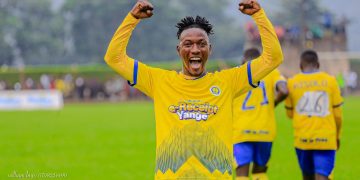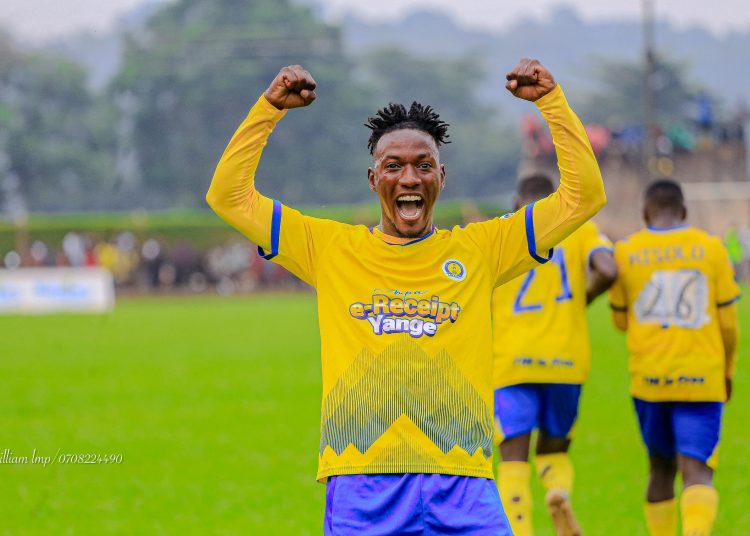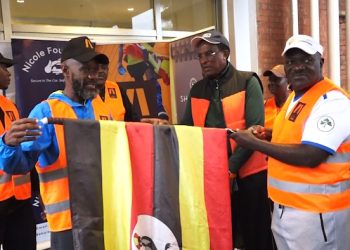URA striker Ivan Ahimbisibwe has carved out an impressive career for himself in Ugandan football. Hailing from Mbarara, the young forward journey has been one of determination and hard work, as he has risen through the ranks to become one of the most prolific strikers in the country.
In this candid conversation with NBS Sport’s Oscar Diego Mujuni, Ahimbisibwe reflects on the key moments and influences that have shaped his career, balancing football with academic pursuits and his aspirations for both personal and team success.
His insights provide a valuable glimpse into the mindset and drive of a young footballer determined to make his mark on the national and international stage.
Who is Ivan Ahimbisibwe?
Ivan Ahimbisibwe is a URA forward who was born and raised in Mbarara City, in Kacence village. I am a son of Mr. Ahimbisibwe Jackson and Annet Mutesi.
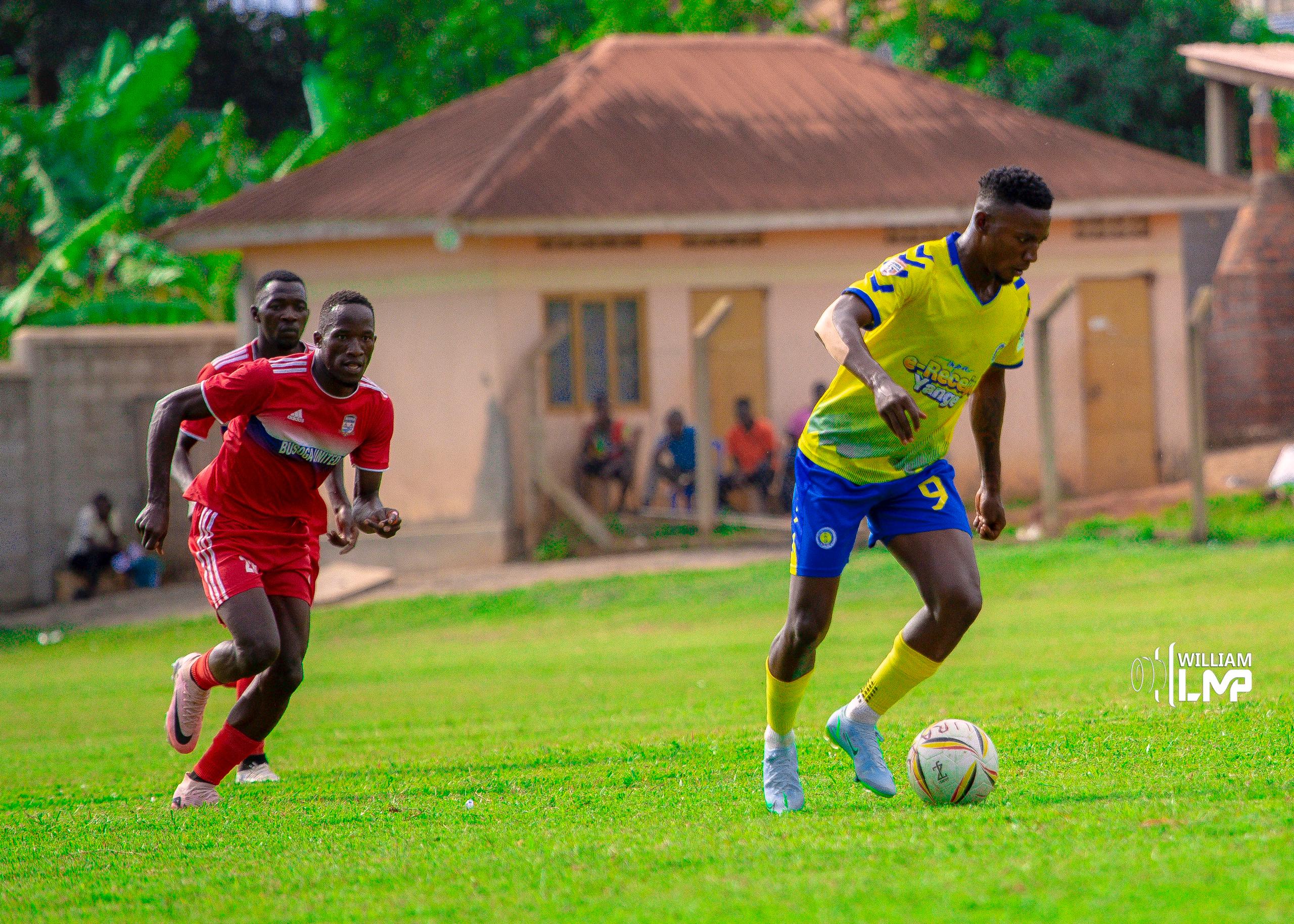
Describe your football abilities. What kind of player are you?
I am a lethal forward who is good at scoring goals, fast, and a very good passer and dribbler of the ball. In addition, I can play on the right and left, but I’m mostly a centre-forward.
What is the meaning behind your nickname “hunter”?
I was given that nickname by Mr. Lusulire Ronnie (Ronald), the media officer of URA FC. When I was at UPDF, he always called me and told me how good I was at scoring goals.
He always called me “Muyizzi atasusubwa” (the hunter who doesn’t miss). When I came to URA, and he was unveiling me, he said, “the hunter is here.” So that’s how my nickname came up.
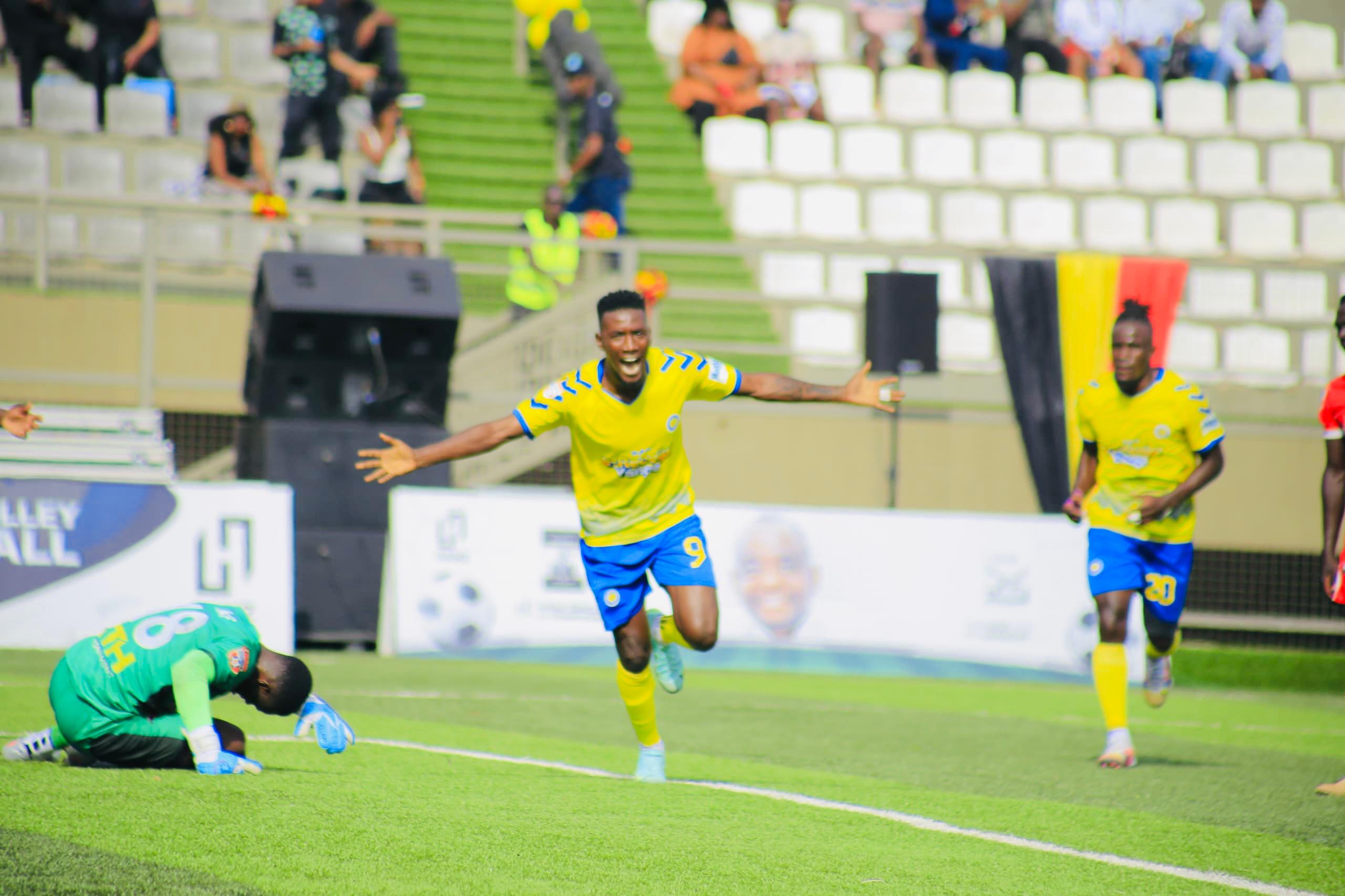
Which schools did you study at?
I started my primary education at Mbarara Modern Primary School, and I later joined Uganda Martyrs Primary to finish my PLE. In secondary, I went to Nyakayojo Secondary School for O’Level and finished my A’Level at St. Andrew’s SS in Rubindi.
Tell us about your footballing journey. When did you decide to play football and what inspired you?
After finishing my P7, I joined the project of Mbarara Sports Academy. Mr. Salim Branden, the manager, was bringing up young talented boys and I happened to be among them. He trained us to be great players and I really appreciate him. I spent about five years in the academy between 2010 and 2015.
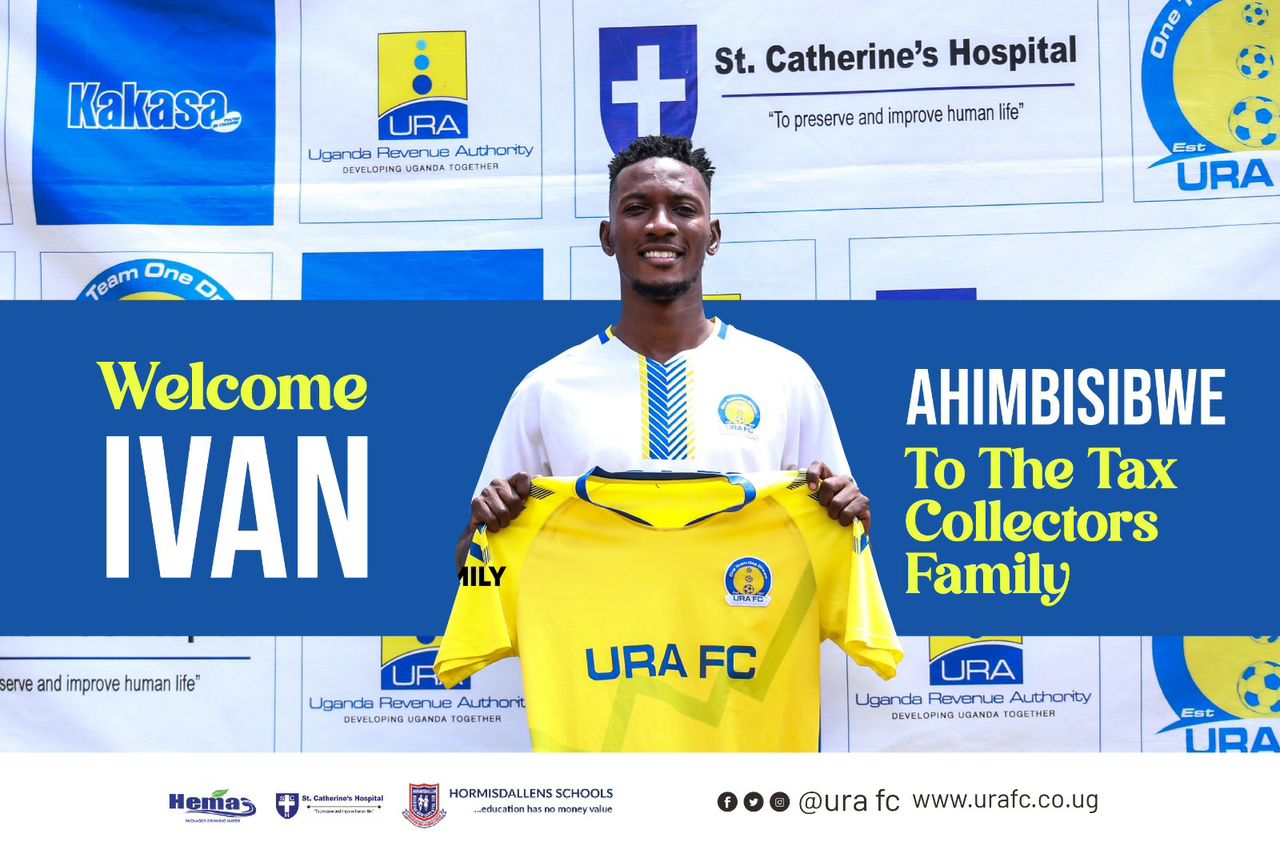
Which notable players in Uganda today did you play with at Mbarara Sports Academy?
There is Kondok Junior, who is now in the Netherlands, Brian Aheebwa of Kitara, and Clinton Kamugisha. The others are still growing in the Big and Regional Leagues.
What team did you join after Mbarara Sports Academy?
From Mbarara Sports Academy, I joined Synergy. They (Synergy) always hosted trips to Mbarara, Jinja, and Kampala as a team from Masaka. So when they came to play in Mbarara in a friendly with my academy, I scored a couple of goals and coach Brian Ssenyondo spotted me and that’s how I joined Synergy. Coach (Brian) got me from the academy and gave me a chance to play in the Big League.
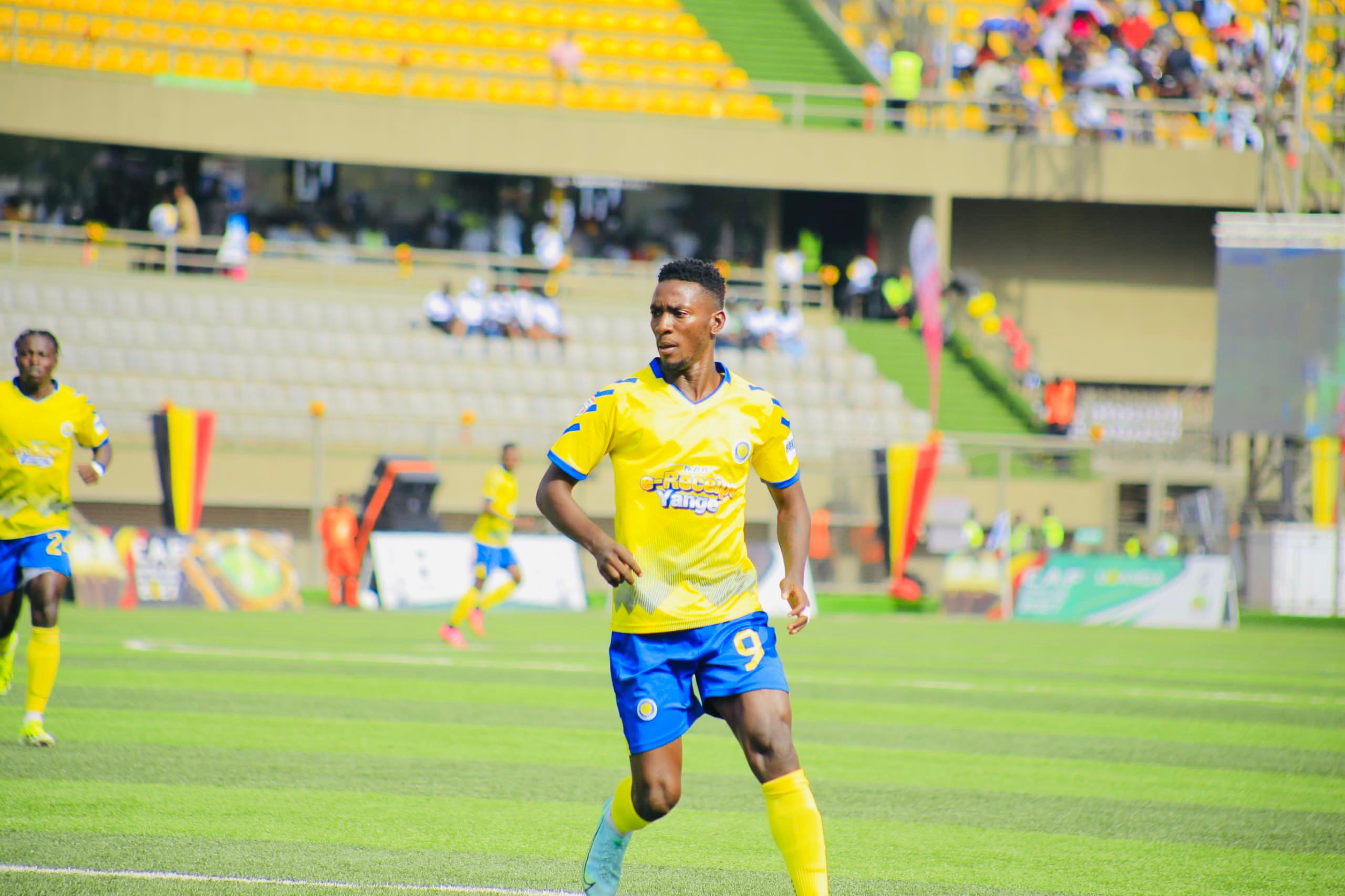
Can you share some insights about your time at Synergy and how playing there shaped your career?
Synergy was a very good project, and it had the best coach in Brian Ssenyondo, the best players, and played competitive football in the Big League, which had many good players. I used to train at Synergy every day to perfect myself and I learnt and improved continuously. We played many games, and the more games you play, the stronger you become, so I got better.
Which other players are products of Synergy?
If you look at the top leagues here in Uganda, there are many players who played for Synergy. There’s Nicholas Kasozi, Solomon Okwalinga, Douglas Oyirwoth, Pius Kaggwa, Frank Yiga, Jibril Nsiimbe, and many others. We always converge and smile because of the project we had at Synergy.
For how long did you play for Synergy and how many goals did you score while there?
I played for Synergy for two and a half seasons. In the first season, I scored 18 goals and in the second season, 15. I played half of the third season and scored 8 goals in the first round.
How then did you end up at Nyamityobora FC from Synergy?
When I left Synergy, I went to SC Villa for half of the season. While there, my father called me and told me to come back to Mbarara and join campus. When I came back for campus, that is how I joined Nyamityobora.
Scoring 15 goals in your first season at Nyamityobora was a remarkable achievement. What do you attribute this success to?
Coach Alex Isabirye gave me an opportunity to play although I was at campus. I’d go to campus during the day and train in the evenings. My time there was a success because I nurtured two things at once.
How did you balance playing football while studying at campus at the same time?
Balancing the two things is easy. If you plan your time well and make a timetable for your activities, it works out. I had discussion groups at campus and also trained in the evenings. If you’re focused, knowing what you want and are passionate about whatever you’re pursuing, you can achieve it.
After a presumably successful time at Nyamityobora, why did you leave them for UPDF?
After finishing campus, coach Brian Ssenyondo was also joining UPDF FC. He called me and gave me an opportunity to play for him again. When I got the opportunity, I embraced it with open arms.
How instrumental was coach Brian Ssenyondo to you at UPDF, and what did you learn from him?
Coach Brian Ssenyondo has really been a mentor; he’s been a father figure for many players. To me, he has been everything. I wouldn’t be here if he didn’t give me an opportunity. While at UPDF, he (Ssenyondo) told me that I was really a good forward and motivated me to work hard. He showed me how to do it. He pushed me every day and changed my mentality for the better. So he has been instrumental in my becoming a great player.
What was the key to your consistency, netting 10 or more goals in each of the two seasons you spent with UPDF?
I scored 22 goals at UPDF in two seasons. Scoring those goals in a UPDF jersey was a success for a young boy growing up. The secret was the coach (Ssenyondo) pushing me. I also engaged in individual training and was very aggressive. As a forward, to continue scoring goals, you have to practise every day and work hard. You also have to be very dedicated. There’s no one who has ever dedicated himself to anything and failed. It’s all about dedication and hard work.
You scored a hat-trick in your UPDF debut against Busoga United. How did that feel?
Scoring a hat-trick in my debut was a great feeling. It was a perfect start to my time at UPDF, and it boosted my confidence immensely.
How did it feel to be named the MVP for UPDF in your last season?
I was really very happy. I was a young boy who was growing, and I was scoring goals in the league. To get that recognition was really an achievement.
What then motivated your move to URA at the start of last season?
My contract at UPDF ended since I’d signed for two years with the club, and coach Brian left UPDF to join Kitara.
Coach Muhumuza Fred called me, and I thank him for giving me an opportunity at URA. So when he asked me to join, I told him I was ready and decided to grab that opportunity with both hands. I’m forever grateful to URA. I signed for two years at the club and I’ve completed one so far, and I’m really happy to be there.
URA finished 8th last season. Do you consider that a success or not?
It hasn’t been a good season for us because URA is known for great achievements. We didn’t achieve anything in the past season, and because of that, we are preparing with our new Coach Isabirye (Alex) so that we can have success this season. We are looking forward to having a better season.
What do you think were the reasons for a rather bad season for URA?
Before the season started, we lost our beloved coach (Sam Timbe) and that shook us. Besides that, we had to come together and try to do well although we started the season off with losses. As a club, there are always some difficulties and we’re looking forward to rectifying them and being better in the coming season.
What are your personal goals for next season?
As a player, the expectations are high for me to score many goals. I also want to win titles because URA is a big club and we have very good national team players who are capable of doing better.
Last season, I didn’t do so well; I scored 8 goals in league games and 2 Uganda Cup goals, making them 10, so I need to sharpen up because we really need to compete for the best next season.
As a forward, what I expect is to score goals as I promised URA fans. I’m going to push every day for maximum points because every game counts. We have to win games. And to win games, we must score goals. If you keep scoring, you lead the league as the top scorer and that is one of the best achievements. Once you achieve that, it means the team will be able to compete for the trophy.
As a club, what are the aspirations for URA for the upcoming season?
URA is a very good club, ambitious, and we’ve acquired an ambitious coach in Mr. Alex Isabirye. He told us as soon as he came that we should forget the old, what has been done, and look forward by sharpening our minds and focusing on getting that trophy. We must be committed, and working with him. He has achieved a lot, and we are ready to fight for that this coming season.
We are currently in the transfer market. Have any clubs contacted you for possible moves? If yes, which clubs are they?
Of course, there are many clubs, but I’m still a URA player. I have a season left, so I really have to be open to them and tell them that I’m still serving a contract with URA.
How do you stay mentally and physically prepared to perform at such a high level consistently?
There’s no day that you’re going to work hard and not achieve what you’re working hard for. Physically, I go to the gym, I have extra training, even when I’m not playing. If you’re not prepared, you really can’t do well. Because time comes when the game needs you and you’re not okay.
I want to tell young footballers to work hard, train, go to the gym, make road runs and listen to the coaches. The more you listen to them, and get to know what they want, you’ll become better.
What influenced you to study Social Work and Social Administration at campus?
I’m a very passionate person in matters of helping. I like being around people and socialising with them.
The reason why I went for that was because I’m really passionate about it. It’s the only course I wanted to pursue because when you study it, there’s a way to interact with people.
How did your education influence your approach to your football career and life in general?
When you go to school, there’s a perspective in which you view things. You’re enlightened about a lot of things. Even when the coaches bring instructions for you, you’re sharp enough to understand them very quickly.
When coach David Obua came (to URA) he was full of big and creative instructions. You had to be wise to understand what he was saying. Going to school helps you to understand. Secondly, education helps you to socialise with people and live with them easily.
What are your long-term goals in your football career? Are there any specific milestones or achievements you aim to reach?
I want to be a happy man. A man that has achieved in football because I’ve really put in a lot into football.
My target is to go professional, play outside the country like in Europe, and also play for the National team.
What advice would you give to young footballers who aspire to follow in your footsteps?
There is time. They should work hard. They’ll get opportunities because they are there. There are good coaches like Brian Ssenyondo who can give them opportunities because he has given many of us.
Work hard, pray to God and more so, they should go to school, pray and listen to the coaches. Most importantly, they should work hard because there’s no person that works hard and doesn’t achieve.
